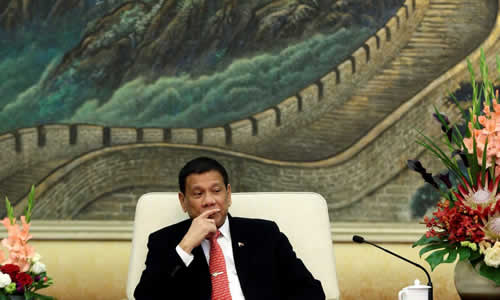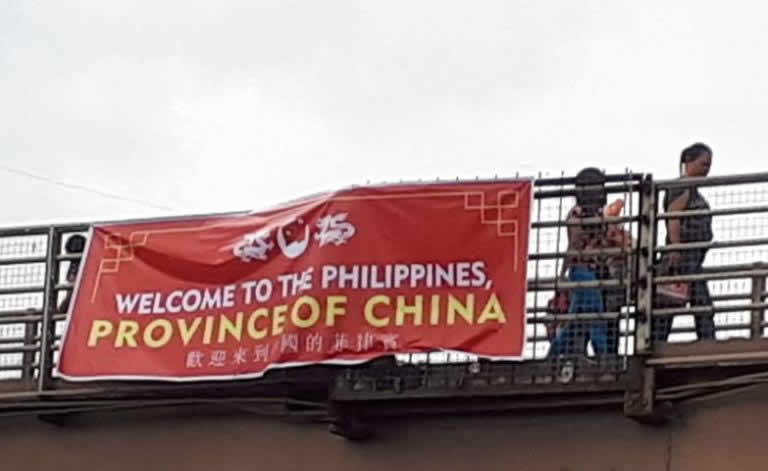|

President Rodrigo Duterte at the Great Hall of the People
in Beijing
Photo:
Reuters/Wu Hong
 n
late May of 2005, Chen Yonglin, a young, up-and-coming, junior diplomat
assigned to the Chinese consulate in Sidney, Australia defected. Chen
asked Australian authorities for political asylum for himself, his wife,
and their young daughter. After defecting, Chen made a stunning
revelation. He told the Australians that China had more than a thousand
undercover agents and informants operating in their country. n
late May of 2005, Chen Yonglin, a young, up-and-coming, junior diplomat
assigned to the Chinese consulate in Sidney, Australia defected. Chen
asked Australian authorities for political asylum for himself, his wife,
and their young daughter. After defecting, Chen made a stunning
revelation. He told the Australians that China had more than a thousand
undercover agents and informants operating in their country.
At first, Australian authorities found that number hard to believe.
After all even during the height of the Cold War, the Soviet Union never
had more than a few dozen spies operating in Australia at any given
time. Chen’s revelations however, have since been corroborated by
various sources. Australian Clive Hamilton, in his book “Silent
Invasion” explains why Communist China places an unusually large number
of spies in a particular country: “Chinese intelligence gathering
operates on a different model. In addition to traditional kinds of
spying, China recruits large numbers of people of Chinese heritage to
collect and pass on useful information, including commercial and
military secrets and information on the activities of ‘unpatriotic’
groups ... The [Chinese] embassy collates the information and sends it
to Beijing or uses it in its own operations in-country.”
The question then for Filipinos is this: if in 2005, China had over a
thousand spies in Australia, how many spies might they have in the
Philippines in 2018? The Philippines is a lot closer to China than
Australia. And because of the 2016 ruling by the Hague’s Arbitral
Tribunal, the Philippines is now the recognized and rightful owner of
Panganiban Reef (Mischief Reef), Panatag Shoal (Scarborough
Shoal), and several of the other “islands” illegally occupied by China
in the South China Sea. One would thus expect China to have a
significantly greater number spies in the Philippines today than it had
in Australia over a decade ago.
Foreign spies in our midst should be no surprise to Filipinos. At the
outbreak of the Second World War, many were shocked to find out that
their Japanese gardeners, drivers, and house boys were actually officers
in the Japanese Imperial Army who had been spying on the Philippines.
With Philippine President Rodrigo Duterte seemingly under the spell of
his Chinese counterpart Xi Jinping, it would be difficult to ascertain
the true extent of China’s clandestine operations in the country.
Suffice it to say that it is likely very significant and encompassing.
This is because it is extremely important for China to control the
narrative regarding the South China Sea. Since the UN ruling
delegitimized China’s preposterous claims, Xi must make sure that the
Philippines does not “rock the boat” by demanding that China honor the
tribunal’s ruling.
Aside from human intelligence (spies) in the country, China now also has
significant electronic and cyber espionage capabilities. It can listen
in on electronic communications and hack into public and private data
systems. And with legions of well-trained cyber-hackers in Beijing, it
can control social media discourse to give it a pro-China stance. There
may come a point in time when the true sentiment of the Filipino people
will no longer be discernible because of China’s manipulation of the
truth.
A Chinese Province

On July 12, 2018—the 2nd anniversary of the Hague Tribunal’s unanimous
decision, bright red banners appeared on roadway overpasses with the
words “WELCOME TO THE PHILIPPINES, PROVINCE OF CHINA.” Presidential
spokesman Harry Roque quickly surmised that it was the handiwork of
anti-Duterte groups. However, Duterte himself once stated—half
jokingly—that the Philippines could become a province of China. But that
will likely never happen.
Chinese Ambassador to the Philippines Zhao Jianhua also reassured
Filipinos that their country will never become a province of China …
“not now, not ever.” To experienced China hands in the West, Ambassador
Zhao spoke the truth. Beijing will never accept the Philippines as
anything more than a minor vassal state in the periphery of its grand
Middle Kingdom.
China’s communist leaders see themselves and their countrymen as
descendants of the Yellow Emperor, the primal ancestor of all Han
Chinese alive today. Chinese historians point out that their
civilization goes back more than five thousand years. Therefore all
other countries are not on an equal footing with China. As far as they are
concerned, Americans, Europeans, Africans, and other Asians are all
barbarians.
Thus the best that Asian countries like the Philippines, Vietnam, Korea,
Cambodia, and Japan can aspire to, is to be a tributary or vassal state
of mighty China. As far as the Chinese are concerned, their country will
soon eclipse the United States in wealth and military power to become
the undisputed global hegemon for a very long time. And one thing we can
be sure of is that the Philippines will never be one of its provinces.
Published
7/21/2018 |